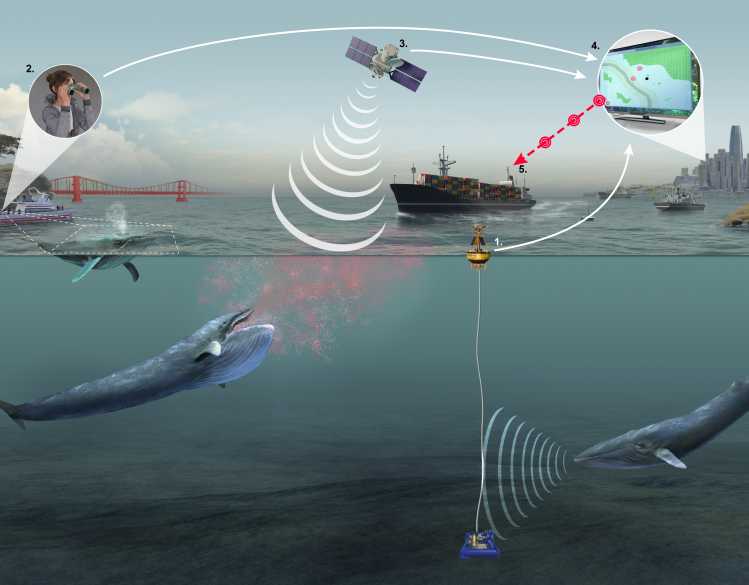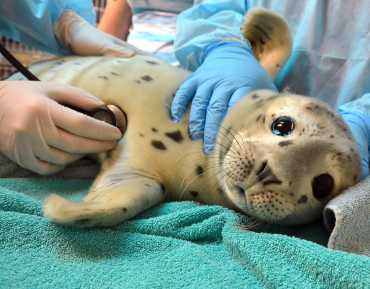
Whale Safe – an AI-enabled System to Prevent Ship Collisions with Whales – to Launch off the San Francisco Coastline
- Species conservation
- Pathology
- Climate change
On the heels of a ship strike killing Fran, the most photographed whale in California, Whale Safe will be deployed in collaboration with The Marine Mammal Center to help detect endangered whale presence and track ship speeds to provide data to the shipping industry, public and government to reduce preventable whale deaths
The Marine Mammal Center and the Benioff Ocean Science Laboratory have announced a collaboration to bring Whale Safe, a technology-based mapping and analysis system to help prevent whale-ship collisions, to the San Francisco Bay Area Region. This extension of the Whale Safe platform, from its start in southern California, is being launched through the generous support of Marc and Lynne Benioff.
"Whale Safe is on a mission to help save the incredible mammals who have ruled the oceans for tens of millions of years,” said Marc Benioff, Chair & Co-CEO, Salesforce.
Whale-ship collisions continue to be a leading cause of death for endangered whales, but with these new kinds of monitoring technology and alert systems, fatalities have begun to decline.
"This is a triple win for the planet – we save the whales, fight climate change, and promote community health by cutting air pollution," Benioff said. "We need more solutions like this coming out of alliances between science and business."
Last month’s tragic death of Fran, the most photographed whale in California, is the latest example of why Whale Safe is needed off the Northern Californian coast. Whale Safe technology will allow the public, media, government officials, and shipping companies and their vessel captains to go online and in near-real time, monitor whale presence in Northern California’s coastal waters.
The greatest threats to marine mammals are caused by people, but we can also be their greatest champions.
Sign up for email from The Marine Mammal Center to stay updated on how you can support solutions and be an advocate and champion for marine mammals.
In addition to providing an immediate benefit for monitoring ship speeds, the data will also be saved and analyzed by the Benioff Ocean Science Laboratory and The Marine Mammal Center to help inform additional preventative safety recommendations.
“Whale-vessel collisions are a global concern, so when addressing the problem and building the Whale Safe system we wanted it to be a blueprint to allow for replication and expansion into other regions,” said Callie Steffen, Whale Safe project lead at the Benioff Ocean Science Laboratory.
We are excited to expand the technology and expertise to the San Francisco Bay region where ship collisions are of high concern for endangered whales.
Today, more than 50 percent of all container ship traffic coming to and from the United States passes through West Coast ports. Blue, fin, humpback and gray whales are vulnerable to ship strikes as they migrate and feed in areas that overlap shipping lanes and routes. Scientists estimate that over 80 endangered whales are killed by ship strikes off the U.S. West Coast each year.
“Whale Safe utilizes best-in-class technology with best-practice conservation strategies to create a solution to reduce risk to whales,” said Dr. Jeff Boehm, Chief External Relations Officer of The Marine Mammal Center. "This is where tech meets Mother Nature for the benefit of marine life. I am incredibly grateful to Marc and Lynne Benioff. Whales and ships must coexist in an increasingly busy ocean."
Whale Safe San Francisco provides data insights to empower decisions that protect whales while supporting efficient maritime commerce.
The number of known whale deaths from ship strikes on the West Coast has been growing over the last decade and the ones we see are only a fraction of the total number that die each year. In fact, scientists estimate the carcass detection rate is only 5 to 17 percent, so the actual number of dead whales is much higher than the number observed and recorded.
Whale Safe utilizes an AI-enabled acoustic monitoring system, big data models and direct whale sightings recorded by trained observers and community scientists. The three data streams are validated, compiled and disseminated in an easily interpreted “Whale Presence Rating” ranging from low to very high whale activity.
Additionally, shipping report cards are created to display a ship or company’s cooperation with voluntary vessel speed reduction zones implemented by NOAA, EPA and the U.S. Coast Guard. This gives the captains of large vessels the data they need to know when to slow down, which is the most effective measure to drastically reduce the number of deadly ship strikes.

Whale Safe has been deployed in the Santa Barbara channel since 2020. In creating a “school zone for whales” where vessel speeds have been reduced, major shipping companies have started implementing the data and slowing down while in transit. When ships slow down, the risk of collision and fatality decreases dramatically.
Whale Safe Santa Barbara and the new San Francisco expansion will show the efficacy of this tool for other locations where whales are at risk of collision with ships such as in San Diego, key ports along the Eastern Seaboard of the United States, and international sites such as Sri Lanka, Chile, Greece and the Canary Islands, to name a few.
“We look forward to the day that ‘whale safe’ becomes as ubiquitous as ‘fair trade.’ We believe consumers care about having retailers transport their products with shipping companies who achieve our shared conservation goal of ensuring whale safe waters,” said Dr. Boehm.
Whales are animals of such great beauty, ecological importance and antiquity. They do not deserve to become roadkill at sea.
“Whales are animals of such great beauty, ecological importance and antiquity. They do not deserve to become roadkill at sea,” said Dr. Douglas McCauley, Director of the Benioff Ocean Science Laboratory. "This is an avoidable problem. We can’t any longer be passive observers of endangered whales washing ashore along San Francisco’s beaches. Whale Safe is an exciting coming together of marine scientists, technologists, conservation organizations, business leaders and government partners to do something about this issue."
Whale Safe San Francisco will be led by the Benioff Ocean Science Laboratory and The Marine Mammal Center, along with leading scientists from Cascadia Research Collective and Point Blue Conservation Science.
The tool was developed in collaboration with leading scientists from Woods Hole Oceanographic Institution, Norwegian University of Science and Technology, the University of California Santa Cruz, University of Washington, Conserve. iO, and NOAA’s Southwest Fisheries Science Center.
Yes, I want to save a life!

Yes, I want to save a life!
You’ll be giving sick and injured animals the best possible care at the Center’s state-of-the-art hospital. With your gift today, you are giving a patient a second chance at life in the wild.
See Our Latest News
{"image":"\/Animals\/Wild\/Gray whale\/cropped-images\/two-gray-whales-golden-gate-bridge-shutterstock-0-0-1270-992-1770234810.jpg","alt":"two gray whales under the Golden Gate Bridge","title":"The Marine Mammal Center and San Francisco Harbor Safety Committee Pilot New Vessel Operator Training Program","link_url":"https:\/\/www.marinemammalcenter.org\/news\/the-marine-mammal-center-and-san-francisco-harbor-safety-committee-pilot-new-vessel-operator-training-program","label":"Press Release","date":"2026-02-06 01:00:00"}

The Marine Mammal Center and San Francisco Harbor Safety Committee Pilot New Vessel Operator Training Program
February 6, 2026
Read More{"image":"\/Animals\/Wild\/Bottlenose dolphin\/cropped-images\/dolphinphoto-by-adam-li-c-noaa-0-0-1270-992-1769539954.jpg","alt":"A bottlenose dolphin jumps out of the water.","title":"What\u2019s the Difference Between Dolphins and Porpoises? And Other Animal Trivia","link_url":"https:\/\/www.marinemammalcenter.org\/news\/whats-the-difference-between-dolphins-and-porpoises-and-other-animal-trivia","label":"News Update","date":"2026-01-26 23:00:00"}

What’s the Difference Between Dolphins and Porpoises? And Other Animal Trivia
January 26, 2026
Read More{"image":"\/Animals\/Patients\/Sea otters\/2025\/cropped-images\/so-mooring-release-2-laurie-miller-c-the-marine-mammal-center-USFWS-permit-MA101713-1-147-8-1270-992-1770307740.jpg","alt":"Sea otter - Mooring","title":"Rescue Stories: Southern Sea Otter Mooring Named the 2025 Patient of the Year","link_url":"https:\/\/www.marinemammalcenter.org\/news\/rescue-stories-vote-for-your-favorite-marine-mammal-patient-of-2025","label":"News Update","date":"2026-01-16 10:05:08"}

Rescue Stories: Southern Sea Otter Mooring Named the 2025 Patient of the Year
January 16, 2026
Read More{"image":"\/People\/Action\/Veterinary care\/cropped-images\/Harris_Green turtle_TMMC-0-0-1270-992-1767649941.jpg","alt":"Heather Harris","title":"Seattle Aquarium Awards Dr. Heather Harris With Prestigious Conservation Research Award","link_url":"https:\/\/www.marinemammalcenter.org\/news\/seattle-aquarium-awards-dr-heather-harris-with-prestigious-conservation-research-award","label":"In the News","date":"2026-01-05 04:48:00"}

Seattle Aquarium Awards Dr. Heather Harris With Prestigious Conservation Research Award
January 5, 2026
Read More


